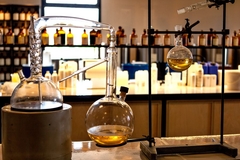Personal care industry opposes EU’s potential ethanol reclassification

The European Commission (EC) may reclassify ethanol as a CMR (carcinogenic, mutagenic, or reprotoxic) substance, banning it from all cosmetic formulas. The ban would include fragrances, perfumes, body lotions, hand sanitizers, and home products. However, the potential ban is causing discussion among industry players, who say the science is based on oral consumption of ethanol, not when topically applied to the skin.
Ethanol is widely used across personal care formulations, especially in fragrances. Therefore, if the EC ban passes, industry players may need to rethink their product formulations.
Personal Care Insights speaks with Greg Adamson, SVP of global regulatory affairs and product safety of Fragrance and Beauty at Givaudan, about what such a ban would do to the industry and how the company is preparing.
“Ethanol has been shown safe for cosmetics and household products through decades of government-approved European use. The industry has objected to the EC that the current cosmetic regulation would cause an automatic ban based only on the hazard classification of ethanol when it is safe and effective in all uses,” argues Adamson.
“This disproportionate regulation is in direct contrast to the food sector regulation, where ethanol can be consumed without restriction. The [personal care] industry has asked for direct intervention by EC leaders at the highest level to address this incoherent regulatory situation.”
 Adamson says ethanol has been shown safe for cosmetics through decades.We also speak with an IFF spokesperson, who says its removal would undermine the integrity of the entire sector without any demonstrable public health benefit.
Adamson says ethanol has been shown safe for cosmetics through decades.We also speak with an IFF spokesperson, who says its removal would undermine the integrity of the entire sector without any demonstrable public health benefit.
Working toward solutions
The EC has previously worked closely with the industry to present safety data substantiating the safe use of ethanol.
Givaudan’s Adamson says there are very limited safe and effective alternatives to ethanol for cosmetics and calls the regulatory situation “disproportionate and incoherent.”
“If the ban comes through, such classification could have far-reaching consequences, not only for cosmetics, perfumes, fragrances, detergents, or cleaning products but also for multiple other sectors,” he stresses.
“It would result in the loss of critical products that deliver health and wellness to consumers, such as hand sanitizers and disinfectant products used to prevent the spread of disease. It would also impact consumers to lose cleaning products that are important for hygiene and wellness benefits in the personal care and fine fragrance space.” IFF further stresses how ethanol plays a critical functional role as perfume carrier.
IFF further stresses how ethanol plays a critical functional role as perfume carrier.
As to whether there are any benefits for such a ban, Adamson says there are none.
“The cosmetics, perfumes, fragrances, detergents, and cleaning products industries are very committed to establishing safe use levels for our ingredients.”
“We are engaging in dialogues with [EU] member states on classification, labeling, and packaging harmonization procedure and its downstream impact on consumer products, including cosmetics, fragrances, and detergents. We aim to prevent disproportionate impact on downstream consumer product safe use of CMR1b classified chemicals,” details Adamson.
Crucial role in fragrance and sanitizers
IFF further stresses how ethanol plays a critical functional role as a perfume carrier or diffuser, and it has been used safely in that capacity for centuries.
“Ethanol is not an olfactive fragrance ingredient, but rather an essential ingredient for the final product used by consumers, for which no suitable alternative exists due to its unique properties, performance, and scale of use.”
IFF details that the fragrance industry is concerned about potential proposals to restrict ethanol for cosmetic end users, including perfumes and fine fragrances.
“We are engaging constructively with regulators to ensure that discussions remain grounded in science and proportionality,” says the spokesperson.
 Essentica argues that any harmful impact of ethanol when applied to the skin has not been scientifically proven.Specific products, such as hand sanitizers, usually contain between 60% and 95% ethanol, which could force the industry to rethink formulas if the ban is implemented.
Essentica argues that any harmful impact of ethanol when applied to the skin has not been scientifically proven.Specific products, such as hand sanitizers, usually contain between 60% and 95% ethanol, which could force the industry to rethink formulas if the ban is implemented.
Studies have found that the sanitizer will not fulfill its purpose if the ethanol content is below 60%. The US Food and Drug Administration also recommends that the ethanol content in hand sanitizers not go below 60%.
Ethanol in personal care has been investigated for an extended period to determine its impacts on the human body. Still, the harmfulness of the ingredient has not yet been agreed upon.
Science leading up to potential ban
In 2020, Greek authorities argued that there are sufficient claims as to how alcohol exposure, when consumed orally, can have adverse prenatal effects and potentially also through breastmilk.
However, the ethanol producer Essentica argues that any harmful impact of ethanol when applied externally to the skin has not been scientifically proven.
It details that the results concern ethanol when consumed orally, through alcohol consumption, which is “many times higher” than from cosmetic use.
A proposed date for the potential ban has not yet been announced.













